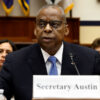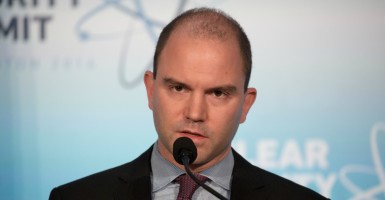Recent remarks by Deputy National Security Advisor Ben Rhodes to the New York Times shows us that the National Security Council (NSC) as an institution is urgently in need of an overhaul.
Rhodes, who handles the president’s strategic communications, takes pride in how he sold the Iran nuclear deal to the American press.
In the absence of rational discourse, we are going to discourse the [expletive] out of this,’ he said. ‘We had test drives to know who was going to be able to carry our message effectively, and how to use outside groups like Ploughshares, the Iran Project and whomever else. So we knew the tactics that worked.’ He is proud of the way he sold the Iran deal. ‘We drove them crazy,’ he said of the deal’s opponents.”
Rhodes’s arrogant comments were quoted by Rep. Mac Thornberry, R-Texas, when he introduced an amendment to the National Defense Authorization Act to reform the National Security Council by capping its staff at 100 and taking away its accreted bureaucratic powers.
Under President Obama, the National Security Council is a far cry from the advisory body envisioned in 1947 when President Truman, hired three people to counsel him on foreign affairs.
It at times circumvents the State Department as well as even the Department of Defense.
The National Security Council today, under National Security Advisor Susan Rice, is some 400 people strong, politicized, powerful, and controlling. It at times circumvents the State Department as well as even the Department of Defense.
In “Memo to a New President How Best to Organize the National Security Council,” Heritage Distinguished Fellow Kim R. Holmes, makes the case that National Security Council reform is within the powers of the next president—no legislation needed.
Holmes advises:
- Limit the leadership pf the National Security Council to two people: The assistant to the president for national security affairs (the national security advisor and one deputy). He or she should adopt a true advisor/model, serving the president, prioritizing issues for the president’s attention. The aim is not trying to run an independent foreign policy team.
- Avoid bloat and keep the number of National Security Council staff as small as possible. The job should be to formulate forward-looking strategic documents and monitor the implementation of policy by the cabinet departments.
- Don’t insist on consensus decisions and avoid too much process. National Security Council staff are overwhelmed by too many meetings and operational details. An overemphasis on consensus works against giving the president a range of policy options.
- Choose a cabinet that can work together as a team, who are philosophically compatible and team players. Mediating between warring cabinet members is distracting and energy consuming for the National Security Advisor.
- Have the assistant to the president for homeland security and counterterrorism report directly to the assistant to the president for national security affairs. A policy and strategy that integrates national security and homeland security is clearly advantageous.
Reforming the National Security Council should be among the next president’s first tasks. When the National Security Council takes charge of U.S. foreign policy, the results are often disastrous. President John F. Kennedy discovered this during the Bay of Pigs catastrophe.
President Barack Obama has among other failures the debacle of Libya to show for letting the National Security Council run the show.

























